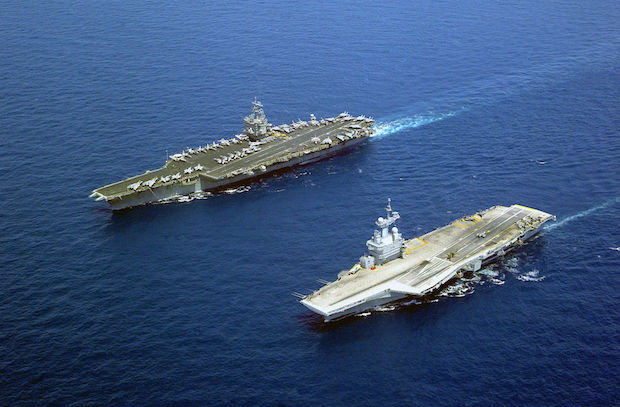PARIS (IDN) – As world leaders prepare to meet in New York next month for the 2015 Review Conference of the Nuclear Non-Proliferation Treaty (NPT), French activists say they are not holding their breath for any real commitment to enforce the 45-year-old accord.
France is the world’s third nuclear-arms power, and while its official policy is that stockpiles should not be increased and that testing must be stopped, the Socialist government of François Hollande is not in favour of total nuclear disarmament.
Hollande’s stance differs little in fact from that of his Conservative predecessor Nicolas Sarkozy, who believed that global disarmament must be based on “reciprocity” – a policy that means essentially ‘we’ll get rid of ours if you get rid of yours’.
The country has both maritime and air-based nuclear capability, and the government’s position, outlined in a 2013 white paper, is that “nuclear deterrence” is a means of protecting “vital interests”.
In February 2015, Hollande reiterated that policy in a speech at a French military air base, saying that possessing nuclear arms acts as a deterrent for enemies, in a “dangerous world”.
“The current international context doesn’t allow for any weakness, and there is no question of letting down one’s guard,” he said.
“One cannot rule out the possibility of future state conflicts that may concern us directly or indirectly,” the president declared.
Disarmament activists counter this stance, warning that France is not fulfilling its obligations under the NPT. They say the country has equally lagged on measures agreed in 2010, when the previous Review Conference adopted a 64-point action plan to push forward implementation of the Treaty.
“There is no reduction of nuclear stockpiling taking place, so we need a treaty that completely bans nuclear weapons rather than banning proliferation,” says Patrice Bouveret, director of the Observatoire des armements, an independent French documentation and research centre devoted to peace-building.
“None of the engagements taken five years ago have resulted in anything concrete,” Bouveret told IDN. “States need to now work on launching a different treaty because the current situation is just as ambiguous as it has been.”
Bouveret’s Observatoire des armements is a member of the Sortir du Nucléaire network (network for Phasing out the Nuclear Age), the main French anti-nuclear coalition that comprises 932 organisations and about 60,500 signatories.
The coalition supports “non-violent actions of civil disobedience” and will participate for instance in a 65-day protest to block Germany’s Büchel military air base which has the last nuclear arms on German soil – stored due to an agreement with the United States.
The protest is a show of “opposition to the stationing of arms” at the base and is set to begin on March 26 and continue until the end of the Review Conference in New York, the group says.
Activists are calling for the original five nuclear-weapon states – France, the United Kingdom, China, the United States, and Russia – to do more to forward their own disarmament, even as they try to rein in the “new nuclear states” of North Korea, Israel, Pakistan, India and (perhaps) Iran.
Only P5 have dismantled testing site and fissile material production installations
France has reported that up to 2008, it reduced its number of air-launched weapons by a third, cutting its nuclear arsenal to “less than” 300 warheads. In February, for the first time, the government further quantified its nuclear weapons, with Hollande saying that the country has three sets of 16 submarine-launched ballistic missiles and 54 medium-range air-to-surface missiles.
France says that it is the only one of the five original nuclear weapon states to have dismantled its testing site and fissile material production installations, and the government has pledged to continue campaigning for the “definitive end to the production of fissile material” for nuclear arms.
But with France and other countries sticking to the deterrence argument, the stakes remain high, and activists are watching to see what will happen at the April 27-May 22 Review Conference of the 1970 NPT.
“Speaking about disarmament remains complicated in our state,” said 10 French parliamentarians in a message to the International Conference on the Humanitarian Impact of Nuclear Weapons, held in Vienna last December with more than 1000 delegates attending.
“Too many high-ranking civilians and military officials perceive nuclear disarmament as an act of treason or threat to French security, increasing the complexity of the debate,” said the message, which was notably signed by Hervé Morin, a former defense minister.
“This is a wrong perception, because France is diplomatically engaged ‘to adopt policies that are fully compatible with the Treaty and the objective of achieving a world without nuclear weapons’,” the parliamentarians added.
They said that in order to reduce and eliminate nuclear weapons, France and its government need to “understand the positive gains” of this process.
“Today too few of our colleagues have understood the risks posed by the worldwide arsenal of 16,300 nuclear weapons,” said Jean-Marie Collin, director of the French branch of Parliamentarians for Nuclear Non-Proliferation and Disarmament (PNND), an international network that provides up-to- date information on nuclear-weapon policies.
It’s clear, however that even if France wants to keep its own weapons, it does not want ownership to spread to “less stable” states. In his February address, Hollande slammed the “race” among some countries to acquire nuclear arms. [IDN-InDepthNews – March 23, 2015]
Photo: The French nuclear-powered aircraft carrier Charles de Gaulle and the American nuclear-powered carrier USS Enterprise (left), each of which carry nuclear-capable fighter aircraft | Credit: Wikimedia Commons


